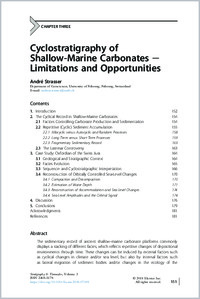Cyclostratigraphy of shallow-marine carbonates – limitations and opportunities
- Strasser, André Departement de Géosciences, Université de Fribourg
-
01.01.2018
Published in:
- Stratigraphy & Timescales. - 2018, vol. 3, p. 151–187
English
The sedimentary record of ancient shallow-marine carbonate platforms commonly displays a stacking of different facies, which reflects repetitive changes of depositional environments through time. These changes can be induced by external factors such as cyclical changes in climate and/or sea level, but also by internal factors such as lateral migration of sediment bodies and/or changes in the ecology of the carbonate- producing organisms. If it can be demonstrated that the facies changes formed in tune with the orbital (Milankovitch) cycles of known duration, then a high-resolution time framework can be established. This demonstration is not an easy task because the orbital signal may be too weak to be recorded, or it may be distorted and/or overprinted by local or regional processes. The limitations of the cyclostratigraphical approach are discussed, but a case study from the Oxfordian of the Swiss Jura Mountains also shows its potential. A well-established chrono- and sequence- stratigraphic framework and detailed facies analysis allow identification of elementary, small-scale, and medium-scale depositional sequences that formed in tune with the precession, the short eccentricity, and the long eccentricity cycles, respectively. In the best case, a depositional sequence attributed to the precession cycle with a duration of 20'000 years can be interpreted in terms of sequence stratigraphy. This then allows estimating rates of sea-level change and sedimentation within a relatively narrow time window, thus facilitating comparisons between ancient carbonate platforms and Holocene or Recent shallow-marine environments where such rates are well quantified.
- Faculty
- Faculté des sciences et de médecine
- Department
- Département de Géosciences
- Language
-
- English
- Classification
- Geology
- License
- License undefined
- Identifiers
-
- RERO DOC 323972
- DOI 10.1016/bs.sats.2018.07.001
- Persistent URL
- https://folia.unifr.ch/unifr/documents/307440
Statistics
Document views: 117
File downloads:
- str_csm.pdf: 553
